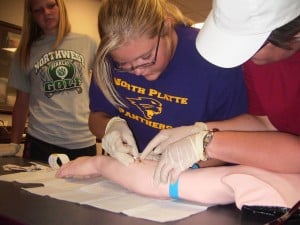Talking to Children about the Shooting
The recent shooting has evoked many emotions-sadness, grief, helplessness, anxiety, and anger. Schools are supposed to be one of the safe places, where students can go to learn and be with friends. Children who are struggling with their thoughts and feelings about the stories and images of the shooting may turn to trusted adults for help and guidance. Reinforcing safety after this tragedy is important with very young children. They need to hear that their parents/caregivers will do everything they can do keep them safe. Schools will be working to be sure that their school is a safe place for learning and having fun with friends and classmates.
- Start the conversation. Talk about the shooting with your child. Not talking about it can make the event even more threatening in your child's mind. Silence suggests that what has occurred is too horrible even to speak about or that you do not know what has happened. With social media (e.g.; Facebook, Twitter, text messages, newsbreaks on favorite radio and TV stations, and others), it is highly unlikely that children and teenagers have not heard about this. Chances are your child has heard about it, too.
- What does your child already know? Start by asking what your child/teen already has heard about the events from the media and from friends. Listen carefully; try to figure out what he or she knows or believes. As your child explains, listen for misinformation, misconceptions, and underlying fears or concerns. Understand that this information will change as more facts about the shooting are known.
- Gently correct inaccurate information. If your child/teen has inaccurate information or misconceptions, take time to provide the correct information in a simple, clear, age-appropriate language.
- Encourage your child to ask questions, and answer questions directly. Your child/teen may have some difficult questions about the incident. For example, she may ask if it is possible that it could happen at their school; she is probably really asking whether it is "likely." The concern about re-occurance will be an issue for caregivers and childrens/teens alike. While it is important to discuss the likelihood of this risk, she is also asking if she is safe. This may be a time to review plans your family has for keeping safe in the event of any crisis situation. Do give any information you have on the help and support of victims and their families are receiving. Let her know that the person responsible is under arrest and cannot hurt anyone else. Like adults, children/teens are better able to cope with a difficult situation when they have the facts about it. Having question and answer talks gives your child ongoing support as he or she begins to cope with the range of emotions stirred up by this tragedy.
- Limit media exposure. Limit your child's exposure to media images and sounds of the shooting, and do not allow very young children to see or hear any TV/radio shooting-related messages. Even if they appear engrossed in play, children often are aware of what you are watching on TV or listening to on the radio. What may not be upsetting to an adult may be very upsetting and confusing for a child. Limit your own exposure as well. Adults may become more distressed with nonstop exposure to media coverage of this shooting. If your child has watched coverage, take a minute to turn off the television and ask the child about what they think about what was seen. This also gives an opportunity to discuss the event and gently correct misperceptions.
- Common reactions. Childrens/Teens may have reactions to this tragedy. In the immediate aftermath of the shooting, they may have more problems paying attention and concentrating. They may become more irritable or defiant. Children and even teens may have trouble separating from caregivers, wanting to stay at home or close by them. It's common for young people to feel anxious about what has happened, what may happen in the future, and how it will impact their lives. Their sleep and appetite routines may change. In general, you should see these reactions lessen within a few weeks.
- Be a positive role model. Consider sharing your feelings about the shooting with your child/teen, but at a level they can understand. You may express sadness and empathy for the victims and their families. You may share some worry, but it is important to also share ideas for coping with difficult situations like this tragedy. When you speak of the quick response by law enforcement and medical personnel to help the victims, you help your child/teen see that there can be good, even in the midst of such a horrific event.
- Be patient. In times of stress, children/teens may have trouble with their behavior, concentration, and attention. While they may not openly ask for your guidance or support, they will want it. Both children teens will need a little extra patience, care and love. (Be patient with yourself too!).
- Extra help. Should reactions continue or at any point interfere with your children's/teens abilities to function or if you are worried, contact local mental health professionals who have expertise in trauma. Contact your family physician, pediatrician, or state mental health associations for referrals to such experts.
·
Talking to
Children about School Shootings: http://smhp.psych.ucla.edu/qf/crisis_qt/APAshooting.pdf
From the American Psychological Association
·
The National
Center for School Crisis and Bereavement:
A Parent Guide http://www.cincinnatichildrens.org/service/n/school-crisis/resources/parent-guide/
·
The National
Child Traumatic Stress Network resources for crisis situations: for schools:
http://www.nctsn.org/resources/audiences/school-personnel
·
Psychological
First Aid: Parent Tips for Helping
School Aged Children after Disasters provides information about reactions,
responses and examples of things to do and say:
http://www.nctsn.org/content/psychological-first-aid
·
The Missouri
Department of Mental Health Fact Sheets for Coping for schools, adults and
children: http://dmh.mo.gov/disaster/factsheets.htm









